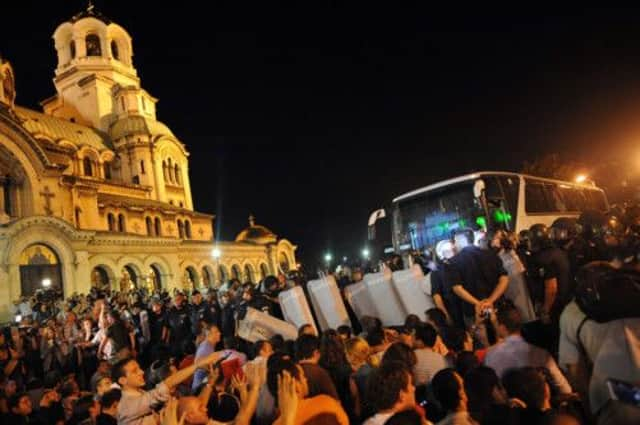Bulgarian MPs under siege at parliament


Security forces only managed to lift the siege early yesterday morning. Around 20 people were injured in a series of confrontations between police and stone-throwing demonstrators.
The Bulgarian capital, Sofia, has experienced 40 consecutive days of anti-government protests by people angered by the left-wing government’s apparent inability to root out corruption and fight poverty, but this was the first time a demonstration had turned violent.
Advertisement
Hide AdAdvertisement
Hide AdThe appointment of controversial media mogul Delyan Peevski as head of the national security agency originally sparked the current wave of protests. The appointment was immediately revoked, but demonstrators insist prime minister Plamen Oresharski, who heads the Socialist-led coalition, must resign. He has refused, saying it would only deepen the crisis.
The prospect of further violence prompted Mihail Mikov, parliament’s speaker, to tell MPs to stay at home yesterday.
“Order must be guaranteed,” he said. “Legislators cannot be turned into targets, their life and health cannot be put in danger. The legislators are not elected to work under pressure and ultimatums, they have every right as the rest of Bulgarian citizens.”
The fighting around the parliament increased tensions in a country that has been racked by political instability for months.
In April, the centre-right government headed by the Gerb party resigned after protests over utility prices escalated into angry denunciations of a political elite many Bulgarians regard as corrupt and incapable of lifting the country from its lowly status as the EU’s poorest state.
The current coalition government took office in late May following snap elections, but it has faced a barrage of protests, and has been unable to shake off the perception that it differs little from its predecessors.
Following the Tuesday night violence, the Gerb party called for the government to resign and for the president to pave the way for another general election.
Mr Oresharski has so far rebuffed these calls, saying further elections will only add to the instability, and arguing that his administration needs more time in office to make positive changes.
Advertisement
Hide AdAdvertisement
Hide AdSergey Stanishev, leader of the Socialist Party, went further, suggesting that the violence may had been orchestrated by the Gerb party, which had boycotted parliament until Tuesday.
Yesterday he said: “Last night we saw acts of violence, stone throwing, the breaking up of paving stones and the taking of more than 100 people inside the parliament as hostage.
“At the same time, Gerb returned to work in the parliament while all this happened. Apparently someone really wants them back in power.”
President Rosen Plevneliev issued a statement calling on the protesters to keep the demonstrations “peaceful and civilised”.
“For the first time since the start of the protests, we have now witnessed tension and attempts for provocation,” he said. He also called on the police to help keep the protest peaceful.
But in an indication of increasing international concern over the instability in Bulgaria, Viviane Reding, the European justice commissioner, departed from diplomatic protocol and appeared to lend her support to the demonstrators.
“My sympathy is with the Bulgarian citizens who are protesting on the streets against corruption,” she told a Bulgarian civil society group. “Bulgaria must continue its reform efforts.”